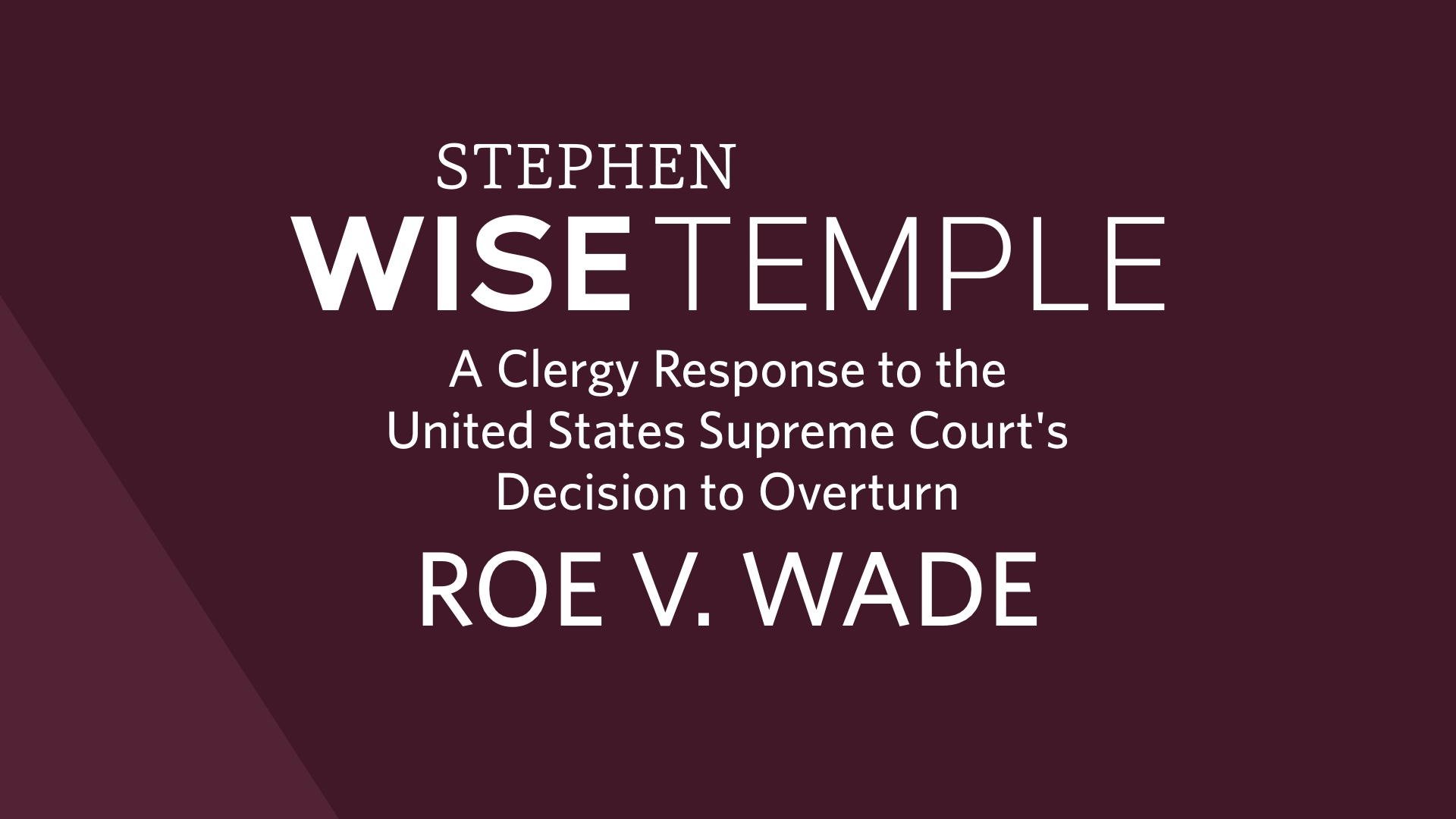Stephen Wise Temple clergy speak out on Dobbs v. Jackson, reproductive rights, and reproductive justice.
“Be fruitful and multiply.”
—Genesis 1:28
From the earliest words of the Torah, our tradition understands reproduction as a sacred act. All of us who have been—or yearn to be—parents know that it is a process imbued with joy, holiness, and anxiety. We have, many of us, sat in waiting rooms; we have received good news and devastating news, we have walked away with ultrasound pictures to add to baby books, and we have faced decisions we never thought we would need to make.
For thousands of years, however, our tradition has understood that the decision was ours to make, in conversation with our healthcare providers. While there are gradations and nuance, Jewish law is overwhelmingly clear on abortion: It is permitted in most cases; it is required in some. Jewish legal experts have—and will—disagree on when and why abortion is permitted, but our texts are explicit in saying that we prioritize a person’s life—including their physical and mental well-being—over a potential life.
 Today, through its ruling on Dobbs v. Jackson, the Supreme Court of the United States overturned almost 50 years of reproductive justice, reversing the precedent set in 1973 by Roe v. Wade and triggering laws that will effectively ban legal abortion altogether in more than 20 states. Many of these laws will ban abortions performed after six weeks even in cases of rape or incest. These changes will affect tens of millions of people around the country who may have to cross state lines to seek reproductive health care, if they are even able to do so. Moreover, lack of access to reproductive care will predominantly affect Black and brown women and families, and those who already struggle economically. Make no mistake: Some of those affected will be Jewish women, who are not only losing their access to reproductive care, but also their freedom to make choices consistent with their religious values.
Today, through its ruling on Dobbs v. Jackson, the Supreme Court of the United States overturned almost 50 years of reproductive justice, reversing the precedent set in 1973 by Roe v. Wade and triggering laws that will effectively ban legal abortion altogether in more than 20 states. Many of these laws will ban abortions performed after six weeks even in cases of rape or incest. These changes will affect tens of millions of people around the country who may have to cross state lines to seek reproductive health care, if they are even able to do so. Moreover, lack of access to reproductive care will predominantly affect Black and brown women and families, and those who already struggle economically. Make no mistake: Some of those affected will be Jewish women, who are not only losing their access to reproductive care, but also their freedom to make choices consistent with their religious values.
Today was a devastating blow to anyone who believes in the right to choose; it is also a devastating blow to those of us who live in this country as a religious minority, and who suddenly find the teachings of our tradition and the counsel of our clergy to be at odds with our nation’s highest court.
Both our own Reform Movement as well as our Conservative colleagues have been outspoken about supporting women’s rights and reproductive justice even before 1973. This issue is core to our deeply held principles of equality and personal autonomy.
As painful as this moment is, we know that our task is not to give in to despair but rather to raise our voices and take action. We invite you to join us for a gathering of the broader Jewish community this Sunday at 5:30 p.m. at Leo Baeck Temple to mourn, grieve, express our outrage, pray, learn, and be together. And in the coming weeks and months, we will offer our communities opportunities to learn more and get involved. As your clergy and as a community, we will continue to work to ensure that our religious freedom as Jews—in schools, in the public square, and in health care settings—will not be denied.
We know that, for many of you, this decision is personal. Know that we, your clergy, are here for you and your family as you walk through these moments and these decisions. We hope you will reach out to us as and when you need to. As we head into Shabbat, we wish you Shabbat peace—and Shabbat hope.
L’Shalom—
Rabbi Yoshi Zweiback
Cantor Emma Lutz
Rabbi David Woznica
Rabbi Ron Stern
Rabbi Sari Laufer
Rabbi Josh Knobel
Rabbi Eli Herscher
Take Action for Reproductive Justice
- Join us for an outdoor gathering of the Los Angeles Jewish community this Sunday at 5:30 p.m. at Leo Baeck Temple (1300 N. Sepulveda Ave., Los Angeles, CA 90049) to mourn, grieve, express our outrage, pray, learn, and be together. Rabbi Sari Laufer will be participating.
- Tonight at 6:15 p.m., we will celebrate Pride Shabbat. We hope you will attend in-person as we hold on to joy and to each other, honoring those who have long been denied justice and equality in this country.
Helpful Resources for Reproductive Rights Advocacy
- The Jewish Center for Justice offers immediate resources on how to donate to various abortion funds, as well as scripts you can use to help lobby national and local representatives.
- The National Council of Jewish Women has a resource page for reproductive health, rights, and justice. It includes talking points, a guide to abortion and Judaism, and rally signs. Find their resource page here.
- Women of Reform Judaism have a reproductive health and rights page with advocacy guides, resolutions, statements, and ways to help kickstart community advocacy around reproductive issues. Find their reproductive rights guide here.

